#ffvii analysis
Text


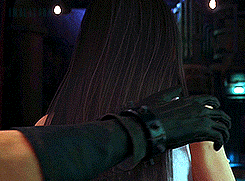
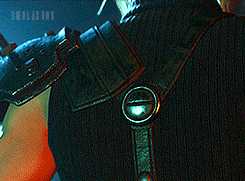
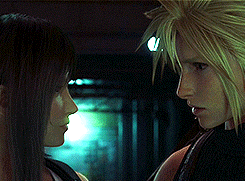
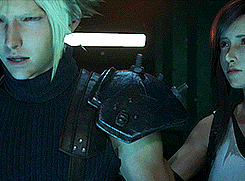
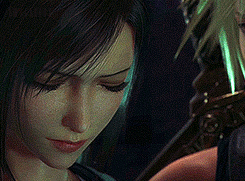
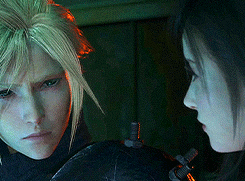
"You Okay?" • "I'm Okay."
Cloud Strife & Tifa Lockhart
Nibelheim Flashbacks • Final Fantasy VII (Rebirth)
Bonus: Yuffie Sees All

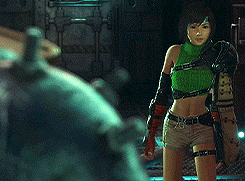
#...I made the gifset yesterday and knew I had to make this too. these happen within MINUTES of each other (& near yuffie both times)#the bond between these two was so plain throughout this game and I am OBSESSED with it#cloti#cloud x tifa#cloud strife#tifa lockhart#yuffie kisaragi#my gifs#ffvii gifs#ffviir spoilers#ffvii rebirth spoilers#final fantasy spoilers#userlockescoles#ffedit#ffgraphics#ff7r#ff7 rebirth#final fantasy vii#ff7 spoilers#ffvii analysis#< barely but. parallels always go in that equvalent tag for my ST stuff lmaoooo#flashing tw
309 notes
·
View notes
Text
Saw something on Twitter that asked what the point of Genesis was; whether people liked his character or tolerated him. They suggested that he was badly used as an interesting character and I just want to throw my two Gil in here.
To me Genesis is perfectly used in Crisis core but you have to understand what his role is in mythology/alagorical sense to truely appreciate him. I am not trying to be pretentious when I say that I’m genuinely meaning it.
Genesis isn’t just the Loveless obsessed mini boss. There is actual depth to his character. However, his characterisation confuses a lot of people because it’s different from others.
Genesis at the core of his characterisation (and goddess knows it would inflate his ego if his character had been made that self aware.) acts as one of the fates. He is prophet, death bringer and actualiser. He recites the prophesy [Loveless] and brings about the events of FFvii.
Loveless cannot be read as anything other than a prophesy. It just can’t. You just need to listen to all of the lines that are vocalised to know that:
“When the war of the beast brings about worlds end, the goddess descends from the sky, wings of light and dark spread afar she guides us to bliss her gift everlasting.”
Arguably this stanza references the war in Wuti and the creation of Genesis, Angeal and Sephiroth. “Wings of dark and light” references quite literally their own singular mutations that spring forth as a black wing (Genesis) and a white wing (Angeal and Sephiroth). It then goes on to highlight their ascension into their life stream. This is simply the prologue.
The mistake everyone makes is assuming that the poem is simply talking about the three firsts. It’s not. It is dually talking about the trinity and Seph, cloud and Zack.
“Infinite in mystery is the gift of the goddess. We seek it thus and take to the sky. Ripples from on the waters surface the wandering soul knows no rest.”
This part of Act one refers to both Sephiroth and Cloud. Sephiroth is the one in CC who is wandering lost without a home nor a family. His friends have deserted him, and he is alone. By FFvii this is Cloud. He quite literally cannot catch a brake.
The “ripples from the waters surface” surface is the reflection of the two stories. It is the distortion of Sephiroths identity as the hero he has been trained to be into the monster he becomes. It is also the distortion of clouds own identity as his mind is broken and takes on someone else’s identity.
“Three friends go to battle, one is captured, one flies away, the one that is left becomes a hero”
Captured =Angeal and Zack
flies away = Genesis and Sephiroth
Becomes a hero = Sephiroth and Cloud
Angeal is captured more or less in modeoheim and dies. While Zack is quite literally is captured by Hojo with Cloud and dies as a result of that captivity. Arguably Zack was never free.
Genesis was the one who flew away from Sinra and from Nibleheim. He fled before he can behold the consequences of his actions. He his arguably the lynch pin for every major development in crisis core. Had he not challenged Sephiroth; had he not gotten hurt and been unable to heal then nothing that transpired would have happened. Had Genesis not revolted; had he not taunted Sephiroth the plot would never have come to the conclusion it did.
Sephiroth is also the one who flies away in therms of the main FFvii plot because he disappears after Nibleheim, he is the antagonist in a very similar way to Gen in CC. He appears every now and then to fuck up Clouds day and had he not been hurt by Cloud non of what happens in FFvii would transpire because it is that moment that puts Cloud at the forefront of Sephs mind. It is that moment that interests Hojo enough to experiment on Cloud and connect him to Sephiroth via the J-cells.
And then there is the hero left behind. Simply put, Genesis and Angeal leave Sephiroth to become the hero. They make villains of themselves and Leave Shinras golden boy behind to clean up their mess. And when sephiroth dies Shinra immortalises him by reporting that he died a hero. We know this because Aeirth literally states it in FFvii when cloud asked her if she knows who he is and she answers that he was a war hero that died five years previous.
Cloud by comparison is the one left by ALL of them to become a hero. Zack is dead, Sephiroth is now the villain, Genesis and Angeal own deaths impact so much of Clouds own story that they doubly place a burden of expectation upon him. Cloud literally carried all of their dreams and Honour around with him as he uses the Buster sword.
But I digress. Without analysing the entire play (at least the parts we have) you can see from what I have looked at above that Loveless isn’t just some poem; It’s a prophesy.
And Genesis being the one to speak this Prophesy is significant because he is quite literally the lynch pin for all of it. Like I said, had he not been hurt then events would have progressed differently.
I’m not saying he is the most important character of the story. He’s absolutely not; that is Cloud. But he’s not unimportant, nor is he just there. He is one of the most interesting plot devices FFvii has in my opinion.
Because he is quite literally the mouth piece of Minerva. He is a fate of the gods. He is past present and future, and he serves as the narrator at the beginning of the Shakespeare play to profess “two houses both alike in dignity.”
Genesis isn’t nothing. He is a walking Oman of death and destiny.
((Please remember this is my opinion and if you disagree I’d love to know but blessed don’t be rude. I like discussing but I really hate being yelled at.))
#crisis core#genesis rhapsodos#ffvii genesis#cloud strife#ffvii#zack fair#ffvii sephiroth#sephiroth#angeal hewley#ffvii angeal#ffvii crisis core#a little analysis#ffvii analysis
99 notes
·
View notes
Text
Ok! So, follow up to last post about the “Under the Apple Tree”/“Price of Freedom” leit motif and tracking character motives and such. It’s only present in songs that are playing during important character story beats, specifically for Zack, Angeal, Genesis, and Sephiroth. More so for the first three and especially for Genesis (If we wanna go more in depth on that, Genesis mostly accompanies this with reciting “Loveless” but thats another thing on how i think its a metaphor for CC and the comp as a whole).
I think the most important part when the motif is heard is when Cissnei is talking to Zack about what wings symbolize, saying that wings symbolize freedom for those who have none. This ties in that a version of “Price of Freedom” specifically is playing. That conversation changes Zack’s perspective on what Genesis and Angeal having a wing means. So wings are also tied into the themes of “Under the Apple Tree”/“Price of Freedom.” The motif is there for when those characters are moving towards their freedom in some form and even if they aren’t aware of it fully. For Angeal, it leads to his death and passing on the Buster Sword to Zack. For Genesis, it’s his quest for the “Gift of the Goddess” even though he doesn’t fully know what it is and eventually being cured of his degradation. For Sephiroth, it’s finding out the “truth” of his origins and finding a new purpose even if it’s misguided. For Zack, like his mentor, it is also dying and passing down the Buster Sword after one final heroic act so Cloud can be free.
That’s kinda the basis of my theory. There are a lot of other possible themes in Crisis Core, but it mostly comes down to “What would you do for freedom?”
Fever brain is taking over so im gonna leave it at that for now. I’ll probably come back and edit this.
#sephiroth#genesis rhapsodos#angeal hewley#zack fair#final fantasy 7#ffvii#ff7#final fantasy vii#ffvii crisis core#ff7 ever crisis#crisis core#ff7r#ever crisis#theory#ffvii theory#i hope this is coherent#analysis#ffvii analysis
23 notes
·
View notes
Text
Cloud and Tifa's Relationship and What it Means to Final Fantasy VII

It's no secret that Final Fantasy VII is a popular game, it always has been ever since its release in 1997. At the centre of this classic is our protagonist, Cloud Strife, a character so famous that even someone who's never played the game would recognise. With his large sword and handsome character, Cloud is one of the most iconic video game characters of all time, even making guest appearances in games such as Kingdom Hearts and Man at Arms creating a replica of his iconic Buster Sword.
Then there is the heroine of the game, a woman called Tifa Lockhart who is equally if not more popular than Cloud himself. However, if it weren't for her role in the story, there would be no Cloud and therefore no Final Fantasy VII.
Within a story, the protagonist is the leading character, the one whom the audience stays with from dawn until dusk, and none in the narrative of Final Fantasy VII fits that description better than Cloud Strife. After all, he is the character you play as for the majority of the game, but behind his status as protagonist is Tifa Lockhart, the heroine of the game without whom, Cloud would not be whom we all know and love. For it is she whom Cloud sets out to impress by travelling to Midgar to become a SOLDIER First Class, a fact slightly altered under the water tower where they first made a vow so sacred only they ever knew about it - a night under a stary sky. It was there that Cloud made his promise to Tifa that if she were ever in the face of danger, he would come to her rescue, put upon him by the woman whom he'd been in love with from a young age. That night, Tifa realised she was in love with this boy who presented himself as being ordinary, just like any other boy his age, the kind of love that makes you want to be by one's side for eternity.
Years later, unbeknownst to Tifa, that promise was fulfilled, when Sephiroth, the man Cloud once looked upon as a hero betrayed the village of Nibelheim, burning it to the ground in a rage of violent anger. They became all they had left of their childhood and thus is the reason only Tifa could awaken Cloud from his comatose state. Had it not been for Cloud, Tifa wouldn't have survived Nibelheim, and had it not been for Tifa, Cloud would have been comatose forever, and therefore the world would have ended had neither of these events taken place. Cloud is the only one who can defeat Sephiroth and in turn, help save the planet, therefore Tifa is important to him.
Now, the lifestream sequence brings to light the love Cloud harbours for Tifa. By allowing her to explore his subconscious, Cloud is making himself completely vulnerable. Remember, your subconscious is home to your deepest darkest secrets so normally, you wouldn't want anyone exploring it, so for Cloud to allow Tifa to explore his own is a big deal, showing the amount of trust he has for Tifa. Trust is an important part of any relationship, especially a romantic one, and the trust Cloud shows for Tifa is far greater than what a child could show their parent (I, for one, would never allow my parents to explore my subconscious). Within the lifestream sequence, we learn many things about Cloud, including of course, his motivation for joining SOLDIER - Tifa. Ever since the accident at Mt. Nibel when he and Tifa were eight and nine, Cloud has wanted to better himself for Tifa, to be capable of saving her, hence his motives for joining SOLDIER, he wanted her to notice him. Therefore, if Tifa is removed, you have no Final Fantasy VII, because Cloud's story is built upon Tifa, Tifa is his motive, and Tifa is the reason he's the character we all know and love: Cloud Strife, the boy from Nibelheim who defeated the great Sephiroth and saved the world of Gaia. None of this would have been the case without Tifa Lockhart, his childhood friend and the only one capable of salvaging Cloud from the darkness of his mind.
Without Tifa, there is no Cloud, therefore to say something such as 'Cloud's love interest is player choice' or 'Cloud's in love with Aerith' is to undermine the meaning of his character, and what she means to him. Cloud and Tifa have a beautiful romance and if removed, there would be no story, as it is vital to weaving it. This is, in fact, part of what makes it so beautiful, as well as the fact that it's the best relationship you could have whilst still being realistic.
There are many reasons people love Final Fantasy VII, but it wouldn't be the story we all know and love today were it not for the romance of Cloud and Tifa.
50 notes
·
View notes
Text
The First Soldier: Chapter Six
Japanese highlights + analysis
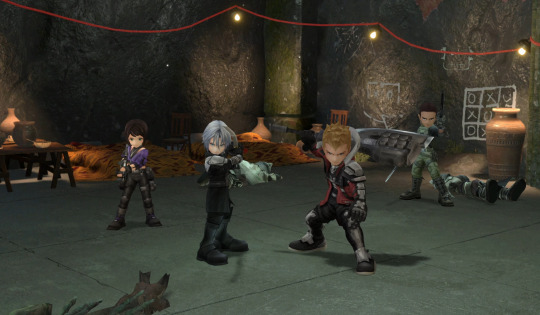
Hi guys! Okay, let’s look right into this chapter-
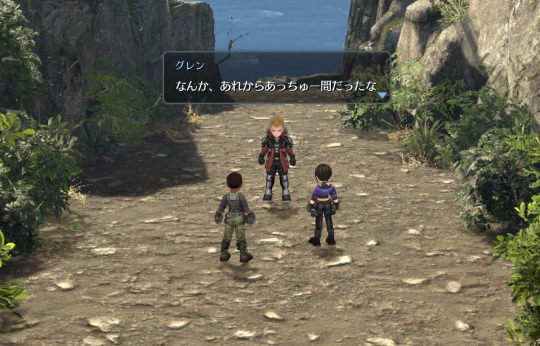
Opening with Team Glenn, we learn some small details. The Shinra dig will start soon, and Glenn marvels at how fast everything is moving. Matt credits Shinra power, Glenn credits their hard work as a team, and Lucia credits Sephiroth, who did most of the work. Glenn, being more humble now, admits that he cannot deny it, and remembers that he must tell Sephiroth about the payment.
However, he notes that Sephiroth does not seem interested in money. This is one of the first hints throughout this chapter that Team Glenn still do not fully understand what Sephiroth is to Shinra. It is a subtle but reoccurring pattern, particularly when the notion of “being fired” comes into play later on.
The English in this scene was good. No major changes.
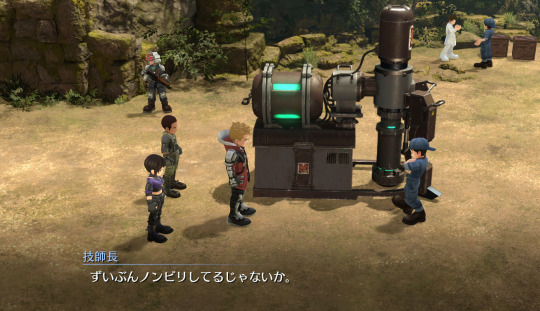
The chief engineer calls the team over and reprimands them for being too relaxed, saying that they need to do their jobs and clear out the monsters near the living quarters. Glenn awkwardly agrees to get back to patrolling, but first he asks,
“Hey, have you seen our squad leader?”
The engineer responds,
“If you mean that kid, isn’t he still out looking through the bodies? It’s disgusting. Please make him stop.“
Glenn is surprised and says, “Sephiroth is rummaging through the corpses?”
Matt notes that Sephiroth does often disappear/go off on his own, and Lucia says to look for him on their patrol.
(Seeing how the other Shinra employees behave and speak helped me see why Sephiroth had no luck asking around about his mother. They are only there to do their jobs, and don’t understand the child SOLDIER at all. It is very much an indifferent workforce).
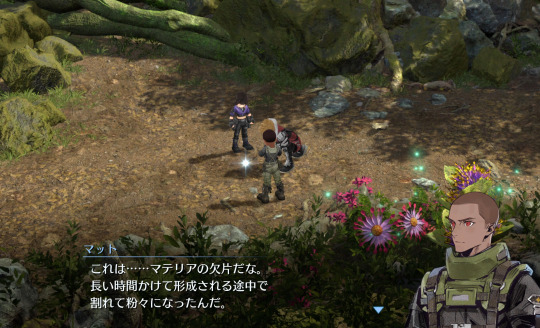
Next is the scene where we learn about the materia fragments that were shattered over time. This scene adds greater weight to the mako spring discussion in the Nibelheim flashback, where Sephiroth comments that the condensed formation must have taken ages. It takes a very long time for even small bits to form, and even then they can shatter.
There is the silly bit of banter between the team about using diversion pebbles/materia fragments, but I must note again that Glenn seems calmer and less cocky even in his jesting.
Then Lucia becomes visibly concerned and says,
“Looking through corpses…I wonder if he’s really doing that…”
Glenn responds,
“The chief engineer is just joking around right? There’s no way he (Sephiroth) would do something like that.”
Matt agrees that there would be no need for it, and the team moves forward.
(It is very wholesome to see them believe only the best of Sephiroth despite what others think, and they are more perceptive and accurate about him anyway. This story constantly leads the audience to worry that Sephiroth always held darker traits before immediately disproving these concerns or at least showing that his reasons were always understandable. Team Glenn speaks for the more optimistic viewers at this point).
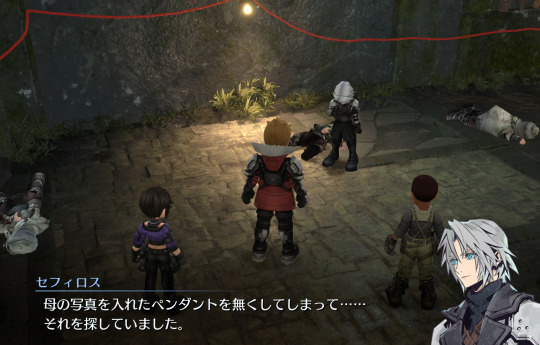
Of course little Sephiroth is caught undeniably searching a body, and Glenn questions him in surprise. Sephiroth is confused at first, but then acknowledges that it does look wrong. Lucia asks him if he is looking for something. Sephiroth says,
“I lost the pendant with my mother's photo in it.. . . . . .I was looking for it. I was checking to see if someone might have picked it up and had it on them…”
(So, a small translation nuance; it is clear in Japanese that Sephiroth dropped it and believed that someone could have picked it up. He is not just looking under bodies, he is going through their pockets and all to see if anyone has it with them.)
Sephiroth chuckles and admits,
“Haha, I suppose I am a corpse-scavenger…“
(This is another case of Sephiroth’s childlike innocence mingling with his very dark reality. He lost his most precious possession like a normal child would, but now has to search for it among the dead that he himself laid to waste).
When the others understand, Glenn says,
“Alright, let’s look for it while we kill monsters.”
And Sephiroth replies,
“Thank you very much…that helps…“
The team moves on to kill monsters and search.

Glenn notes the lesser number of bodies and Sephiroth points out that it was because of the monsters. Glenn shudders to think of dying in the area, but Sephiroth takes the opportunity to beseech them to not let their guard down. He says,
“You all seem to be feeling a little relaxed. You can never be too careful. You must protect yourself. If you don't apply this basic rule...”
Right then a monster swoops in and Sephiroth kills it, stunning the others. He concludes with, “…then even I can’t protect you.”
Glenn asks, “So, you’re protecting us?”
Sephiroth walks up to him and responds,
“It’s because you’re my team.”
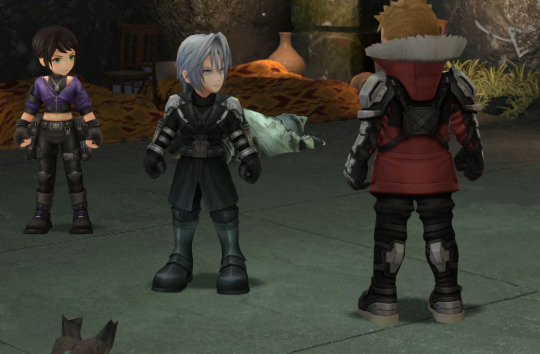
They are interrupted by more monsters, but when the fighting ends, Matt repeats what Sephiroth said.
“I’ll protect you because you’re my team…”
Matt glares at Glenn and says,
“I’d like to hear that from a team-leader I know who previously threatened to hit one of his own squad members…”
Lucia chimes in with the comment about that same team-leader making them be near his gross socks.
(They are both referencing the first chapter of the game, where Glenn’s outburst on the helicopter made it appear as though he were going to punch Matt, and when Glenn made a joke about his socks being so bad that they would pull Lucia out of shell-shock).
Sephiroth looks up at Glenn while shaking his head and laughs, saying,
“Ha…that’s the worst.”
Glenn remarks,
“But it’s “memorable,” isn’t it?”
Sephiroth thinks for a moment and says,
“Yes, I see. So, that team-leader fears being forgotten…”
This observation strikes Matt and even Glenn. They appear to rethink Glenn’s leadership style. Glenn does not protest the observation, but he ponders it.
(I found it sweet that Sephiroth did not judge Glenn, but pointed out what is likely a true insecurity of Glenn’s, but in a very mild and childlike way. Part of me even wonders if Sephiroth understood the fear because he too had struggled with it. After all, adult Sephiroth refused to be a memory even post-insanity.)
(Also, it is hard to fully explain, but reading this text in Japanese—it becomes easier to see how it is not just Glenn that influences Sephiroth, but also the other way around. It’s strange but…it feels as though Glenn has become…softer? Even when alone with his team, he is not disrespecting them so much or being so brash. It was his meeting with Rosen that helped him to develop sympathy for the “enemy” and it was Sephiroth that helped Glenn become kinder to his team. Even the way he speaks seems gentler.
In the last chapter, Glenn was so harsh towards Seph at the beginning, but learned remorse and how to apologize when Sephiroth’s vulnerability was showcased. In this chapter, Sephiroth is the one to understand that Glenn might have been such a brash leader because he feared being forgotten, which was a very perceptive and empathetic observation, causing even Matt to reconsider. It was a very heart-warming scene).
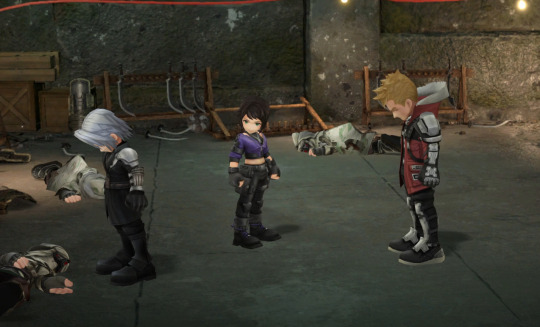
(The next sequence is devastating and I believe it caused some minor controversy with fans because of how Glenn speaks, but I can affirm that the tone in Japanese seems to aim for sympathetic character development. As I mentioned before, Glenn is different to the character we first met, and his arc is becoming more clear as we move forward.)
As the squad looks through the bodies, Glenn notices that there were not many Rhadoran remnants left, and Matt suspects it was because of their living conditions and the endless battle with monsters. Glenn remarks that it must have been a hard lifestyle. He then says,
“...I don't really understand why Rhadore hated the Mako reactors…I mean, there's no such thing as convenient (as the reactors), right?”
They are swiftly interrupted again by monsters, causing Sephiroth to say that they seem more interested than usual.
“The monsters seem more interested than usual.”
“They’re excited about live bait!” Glenn says.
“If you want to be bait, I won't stop you, but as a SOLDIER, please fight first.” Sephiroth urges.
When they clear out the area again, Matt considers the similarities between the Rhadoran believes and “Planetology” or the “study of the star.”
“When a person dies, their life returns to the planet with their consciousness and heart and intersects with the energy of life circulating around the planet. The idea is that a new life will eventually be born from it. The life around this planet is what they call “qi” (mana). The “qi” going around the planet enriches people and nature and the planet itself. It would be unthinkable for Rhadore to consume such an irreplaceable energy.”
Glenn is still confused, and then Sephiroth interjects with,
“Dr. Hojo talked to me about this…
“No matter how rationally and logically we explain things, there are people we will not be able to share understanding with. That is because they see the world differently.””
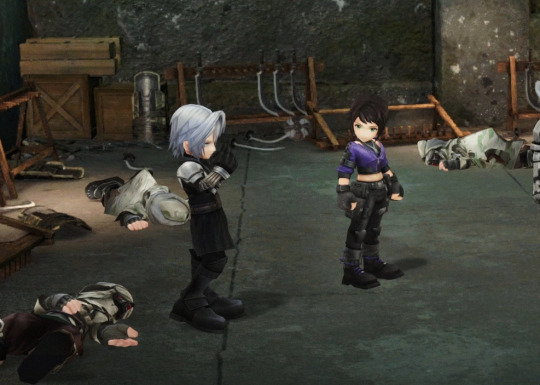
Glenn argues that such things won’t matter if someone dies, and that it would just be better to accept an easy life instead of fighting so hard against it. He points out that Rosen is the only one left, and says that if the Rhadoran beliefs are true, what will become of the last Rhadoran boy when he dies? When he is gone, no one will be left, and people will forget Rhadore.
Sephiroth sadly shakes his head and turns away, saying that,
“The planet remembers…I am certain that is what the people of Rhadore believe…”
Glenn receives his epiphany, and understands that the Rhadorans resisted the consumption of mana/mako because it would erase all memories of life. He is suddenly overcome with sadness and turns to kneel and honor the fallen soldiers. The others do the same.
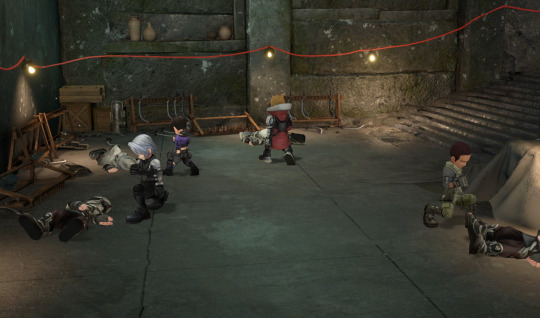
(This scene was, in my opinion, intended to deliver a strong message, but was maybe limited by the story-telling style. Some people were shocked by Glenn’s questioning why the Rhadorans all died for their beliefs when he is with the very company that wiped them out. But I think it does help to remember that this war between Shinra and Wutai was something that soldiers like Glenn and his team only had seen one side of until this point. They were a survey team working for money after all, not the ones directly sent to kill the Rhadorans until Sephiroth arrived, who did most of the work anyway, and even shocked the others with his conditioned ruthlessness in the previous chapter.
Shinra is a propaganda monster, and undoubtedly played off the war as something the Wutaians started and were responsible for, as well as the Rhadorans. It does sound like Glenn is genuinely confused here, especially as someone who was probably used to Shinra being the default government for everything.
“Why would these people willingly die and fight Shinra for trying to make their lives easier?”
But that is the simple darkness of imperialism. Shinra was going to erase something very important to the Rhadorans for the sake of “convenience.”
Glenn only sees this after Sephiroth himself acknowledges the Rhadoran faith. This is where a change of heart occurs. The Rhadorans were fighting for a genuine reason. Of course they were.
I actually felt this was a very meaningful sequence after translating it. Very good attempt at addressing imperialist destruction.)
Afterwards, they keep up the search and Matt asks if Sephiroth is sure he dropped the necklace in the building they are in. He says he had it before the ruins, so he is sure it must have been in the building. Lucia explains that it might be difficult to find if they haven’t already. Sephiroth tiredly shakes his head and says,
“It’s okay. Thanks to everyone for looking together, I think I’m about ready to give it up.”
He is saying that since everyone looked at the same time, he is ready to accept that he has to let the photo go. If they can’t find it together, then it is truly lost. The others become downcast on his behalf, and then Glenn moves over to one of the dead soldiers. He suggests they bury them as a way to say sorry, though he is not sure if that is their custom. Either way, Sephiroth immediately says that he will help, and Glenn is grateful.
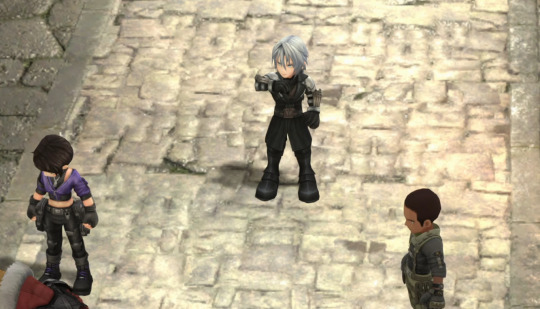
The next scene was clearly translated into English. As they bury the bodies, the dig begins and Sephiroth explains that they will need to evacuate to the sky in thirty minutes, thanks to a possible mako eruption or “torrent of qi” caused by Shinra’s explosives. Glenn remembers Rosen’s words, and Sephiroth says they need to hurry.
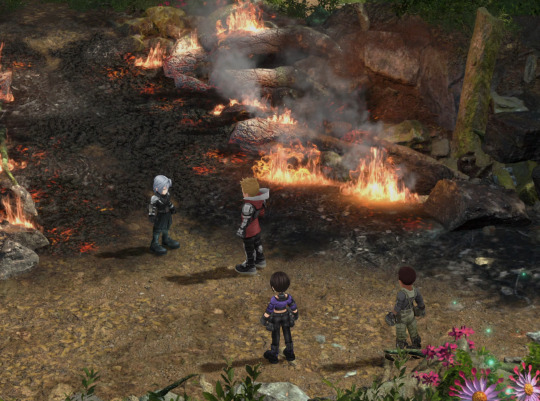
The following sequence is endearing as Sephiroth makes shortcuts for the team. He reveals a unique power that allows him to create great bursts of energy from simple materia fragments. The others are stunned. Glenn, in particular, cannot believe it even after Sephiroth explains. He says,
“No, it’s impossible! Sephiroth, you’re amazing!!”
In the next scene, Glenn is initially ready to chop down a tree to form a bridge across a river, but Sephiroth steps in and says his way will be quicker. Where before, Glenn would have been eager to lead the way, he kindly steps aside and lets Sephiroth take over. Glenn is once again verbally supportive, and says,
“Ha! As expected.”
Sephiroth says,
“As expected of a modified human (cyborg), right?”
Glenn says wasn’t going to say that, nor was he thinking it. Sephiroth says,
“Really?….I’m a little disappointed…”
Glenn is confused and Sephiroth shakes his head,
“I don’t really understand it myself…”
Bringing his head low and his hand to his heart again, he guesses,
“It’s just…nothing you guys say makes me feel bad, so I want you to be able to say anything…”
(The English got the point across as well, but Seph is sincerely saying that he trusts them because they don’t say things that hurt him, so he doesn’t want them to feel as if they need to hold back their thoughts. He is pointing out that he has grown to feel safe with them because they are not malicious with their words. It feels like he discovers the idea of trust in relationships right here).
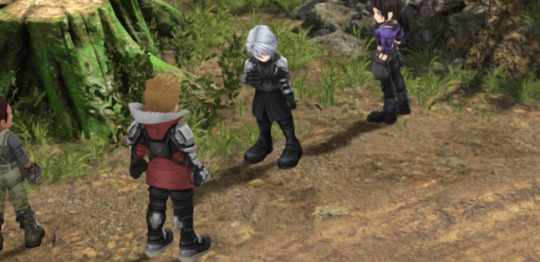
Glenn perks up and says,
“Alright then, I’ll tell you what I think!! I’m counting on you, squad-leader! Now, let’s go!”
Sephiroth enthusiastically responds with “Yes!” and they move on.
The waterfall scene is largely the same. Glenn fully goes to Sephiroth to lead this time and hands him the materia fragment. He asks if Sephiroth can use it like before, and in Japanese, Sephiroth endearingly says he doesn’t want to “make things go boom” but that he has an idea. He freezes the waterfall and Glenn voices his praise again.
When they finally draw close, Glenn stops to think of Rosen, but Sephiroth urges him to hurry. When they get to the overlook, it becomes clear that Glenn and the others are struggling with remorse over the Rhadorans and Rosen being in danger. They exchange glances and Glenn almost says something to Sephiroth, but stops himself.
Sephiroth himself is far more concerned about them, his team, and their safety. The divide is obvious, and a choice will have to be made.
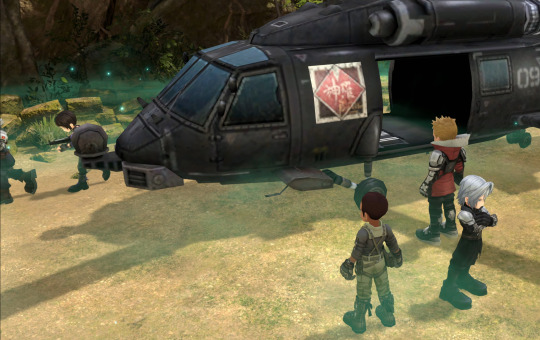
They arrive as the last ones to the Shinra helicopter and the engineer is ready for them to evacuate, but Glenn begs the man to delay the dig so that he can go and warn Rosen, thus setting his plans in motion without forewarning Sephiroth. The engineer refuses despite Glenn’s pleas and brings up the amount of money Shinra has put into the program. Glenn shouts,
“This isn’t about the money!”
And punches the engineer, much to Matt and Lucia’s exasperation.
The engineer says,
“I'll report you to headquarters! I can even have you fired.”
Glenn does not care. It is the first time we have seen him willingly dismiss money and fight for something else. He tells the engineer to get on the other helicopter, and Matt tells Lucia to make her decision. She apologizes to Sephiroth and hi-jacks the copter. Sephiroth simply turns his back quietly.
The final Stamp battle occurs afterwards as an interruption, and the team finishes the job, with more remorse from Glenn about messing with Stamp’s island. Then the engineer flies overhead and drops down the ladder, offering one more chance. Lucia says,
“Will Sephiroth also be disposed of?”
Matt reminds her,
“It’s okay, we’re the only ones at fault. There are witness too.”
With this, the team says goodbye to their leader, and Glenn tells him,
”Sephiroth, take care! Don’t overdo it/push yourself too much!”
They run off, leaving Sephiroth to evacuate, but he hesitates. The engineer shouts,
“Hurry up and get on, hero!”
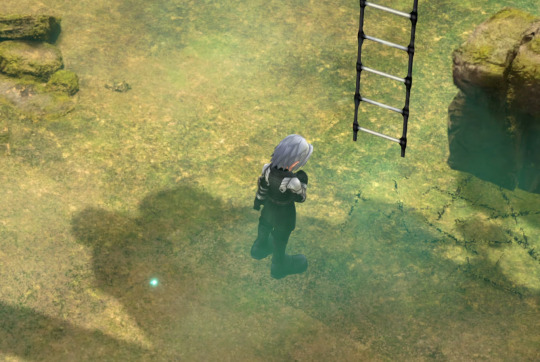
But our hero can’t leave his friends just yet!
He runs up to them and Glenn is surprised. He says,
“You came…….are you sure? If you get on this helicopter, you could get fired, right?”
And the chapter ends with Sephiroth’s simple reply,
“I’m special.”
Glenn just laughs.
—
This appears to be a direct reference to Sephiroth’s future statement about always knowing he was special or different since he was a child.
The word is the same.
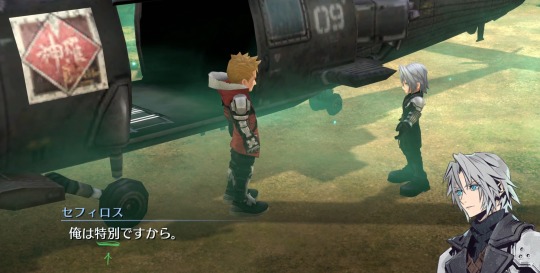
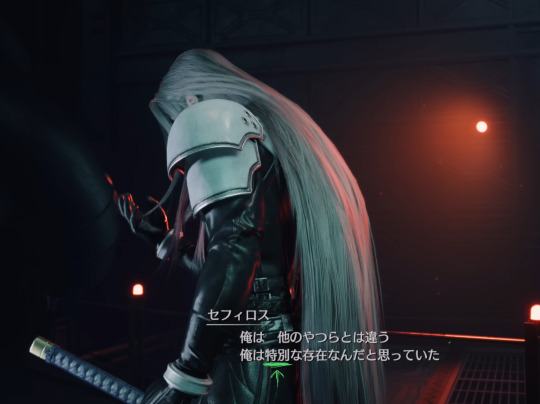
“Exceptional, unique, beyond ordinary…”
But this line from Sephiroth is actually more upsetting to me than funny or cocky, because yes, there is indeed a chance he is merely being proud about being able to get away with his current actions due to his status as Shinra’s hero, but…
There is also the chance he knows he cannot be fired or disposed of because Shinra would never let him leave. They have control over him. He is different or special in that sense too. He is a prized possession, unlike the others.
I have yet to see, but I wonder if Sephiroth knows that he is risking severe punishment for his actions by helping his team and will not be met with a simple lay-off, but since this is his last chance to help and be with his team, he is ready to pay the price. If they are fired, he may not see them again. Now is his chance.
His hesitation at the helicopter is sincere. He clasps at his heart and everything. I don’t believe he is being light-hearted when he tells Glenn he is different. In the English, it came off more prideful, as though Seph were daring Shinra to come after him. In Japanese, I get the feeling he is making a sacrifice.
Sephiroth also believes it is his job to protect his team. If Shinra tries to harm them, he will have to face that. I fear that for now, Sephiroth has not learned that Shinra will not just punish him, but they can also kill people he considers friends.
I also think this chapter was full of foreshadowing.
Even the scenes with Glenn praising Sephiroth and making an effort to do it honestly and constantly felt as though it were meant to be a contrast for what could be shown later if the Shinra higher-ups appear and catch Sephiroth in the act of treason.
I am very proud of him, but I am very concerned for him now.
(I have more thoughts on Sephiroth’s relationship with Team Glenn after this chapter, but I will save it for another post! Hope you guys enjoy this one in the mean time!)
#finally!!!#sorry everyone#that was so hard to get posted and organized#but here we are#i want to format these like this from now on#often the english is decent but there are highlights that offer nuance#so an analysis + these translation highlights might be the best way to approach this#let me know what you guys think!#final fantasy 7#ever crisis#ff7#ffvii#sephiroth#the first soldier#ffvii first soldier#ffvii ever crisis#glenn lodbrok#lucia lin#matt winsord#shinra#my translations
121 notes
·
View notes
Text
I understand people giving Lucrecia the benefit of the doubt with regard to what she did to Vincent, just like I understand people not realizing how undeniably fucked up Gast was, but the important thing to keep in mind about these characters is that the majority of them are written as being in the throes of some pretty extreme cognitive dissonance.
It's not bad writing, it's that they're hypocrites. They reached a moral event horizon at some point, and they did what they felt they had to do when crossing it.
Gast abandoned a child because he wasn't what he wanted—even having raised Sephiroth up until that point and knowing that he was a pretty normal kid overall, as we can see from his behavior as a young teen in Ever Crisis, Gast still couldn't bear to continue to be responsible for a monster. He knew what Hojo was capable of, because he knew about what happened to Vincent, because it happened in his lab, and he left a literal child in his care anyway. Sephiroth's only crime was not being what Gast thought he was, and Gast damned him to a lifetime of torture under a "father" whose only goal was to use him to prove his own genius. Why? Because Gast had a goal, and the goal was what mattered, the ends justified any means he could devise. He was a man obsessed, driven to the verge of madness in his lust for the Promised Land. A religious zealot with the most powerful scientific team in the world at his disposal, ready to prove him right—and then he wasn't right, and the whole world fell apart underneath him. Ifalna gave him back that stability, because she was a real Ancient, and she gave him a new, better child to care for. A child that wasn't a monster, a child that was his, a child that might one day lead him to the Promised Land, if her mother didn't do so first. When Aerith was born, Gast got to be right again, and therefore all was right with the world. Sephiroth (like Genesis before him) may as well have never existed at all.
Lucrecia openly experimented on a man who loved her enough to die for her, going so far as to apparently use data from those experiments to improve her own academic standing, because she couldn't bear the guilt of being responsible for his death. It wasn't about whether it was the right thing to do, it wasn't about whether she loved him back, it wasn't even about her thesis at that point—she just couldn't continue to live having lost everything as a result of her own impatience, her own lack of regard for everyone around her. She killed her mentor through her own impatience, she gave up her son for experimentation, she didn't stop her husband from experimenting on her ex-lover, and she had nothing to show for it but crippling Jenova toxicosis and an equally crippling cowl of regret.
I could even go into Hojo here, how what he did to Sephiroth was a result of struggling to escape Gast's shadow, how what he did to Vincent was a result of him struggling to prove that he deserved his wife, how everything he did was born from the all-consuming need to do just one thing for which no one else could take credit. Hojo got the director position not because he earned it, but because Gast ran away. Hojo got Lucrecia not because he wooed her, but because he didn't have eyes like the unrequited first love that she killed. Hell, Project S only happened because Project G failed! Nothing Hojo has ever had that was worth anything was because of his work, only because the work of others failed. Why do you think he talks about "failures" the way he does? The failure of others is the only reason he's gotten so far, and he knows that any failure of his own will knock him right off that pedestal—and he's terrified.
None of these people are good people. I don't know that any of them ever were. But in their eyes, everything they did was justified, they took the right course of action, because they took the only course of action that their personal understanding of reality would allow them to take.
Were any of them actually right? Probably not. Certainly not, in some cases. But there's no going back on it now. The arrow has left the bow of the goddess, and there's no calling it back.
#fandom ramble#lucrecia crescent#professor hojo#professor gast#gast faremis#final fantasy vii#ffvii#final fantasy 7#ff7#not even getting into the project g crew#mostly because I did a whole ramble on gillian a while back#and I'm not prepared to do a character analysis of hollander#who is possibly more messed up than hojo#for different reasons#but hoooooo boy#he's also dumber than hojo tho#which is his problem#if he were a little smarter#we'd be doomed
77 notes
·
View notes
Text
I noticed something in the new FF7 Rebirth trailer
Sephiroth reveals the nature of Jenova and her ability but why?
Sephiroth never even revealed Jenova like this in the OG as a part of his plan, so why is he doing this? Isn't revealing her nature the last thing Sephiroth wanted to do?
Here's what I think is happening, Sephiroth is being forced to work against Cloud. He traveled back in time, still tethered to Jenova, hoping to stop her and save the planet from whatever destiny it's tethered to (yet it also has consequences as we see in the alternative timeline)
Sephiroth is doing this of his own will
Yet he's still shackled to Jenova, so he needs Cloud's help in order to break free from her, but Jenova is taking advantage of Cloud's shattered mental state and false persona, so it's like a godly game of tug a war.
I think the Sephiroth who's manipulating Cloud and trying to convince him that Tifa isn't real is the past version of him from the OG, while the real Sephiroth, the one who we've been following all along, is trying to break free from destiny's grasp, stop Jenova and save the planet.
I could be wrong, and this is just a retelling of the OG, but I don't buy that one bit, especially when both the developers and part of the story say otherwise. Anyways, that's what I grabbed from this scene.
#autistic rambling#ff7#ff7r#final fantasy 7#ffvii#cloud strife#Sephiroth#sefikura#jenova#ff7 rebirth#my theories#my analysis
310 notes
·
View notes
Note
What if Sephiroth saw Genesis again as his evil self. what do you think would happen? What if Genesis knew of his sins. Causing one of his friends to die. And the other one to go insane. And then die. But come back?
What if Genesis asks Sephiroth for forgiveness?
Ohohohohoho….. that is some GOOD STUFF, buddy >:3c
Genesis can’t even fathom the sight before him. It chills him to the very bone, smothers every bit of satisfaction and smugness and pride that had been curling his lips into a smirk. The smirk is no longer there. Neither is the desire to bring it back. Genesis can’t find the strength to, regardless. Not now. Not anymore.
Not after seeing the look in Sephiroth’s eyes
“Sephiroth….” Genesis vaguely shakes his head, a certain nausea coming to brew in his head as he tries to digest the sight. A certain numbness. “What… what happened to you?”
The question is a ghost to the other’s ears; his response is nothing but a cold ripple of chuckles, and those reptilian slits narrow eerily against the wintry dusk of the wasteland, jade daggers cleaving through air as they scan him up and down.
“SOLDIER….” Sephiroth finally purrs. “You’re a SOLDIER.”
The comment breathes its own brand of ice into Genesis’s veins. It’s not the way he says it that chills him—the sludgelike molasses on his tongue, the way the syllables viscously rolled off and into the air. It’s what he said. The coil of incredulity tightens in his chest, and he responds dubiously that he was one—not anymore—and that Sephiroth was one once upon a time as well. He asks how Sephiroth could possibly say such a thing….. could forget such a thing, only to be returned with nothing but another round of chuckles. Chuckles that soon bubble out into a full, dark, humorless laugh.
Genesis takes several steps backwards as the man continues on with the detached laughter, unnerved. Icy. He swallows.
“Sephiroth…. what is… what is the matter with you?”
He hadn’t known what he was expecting when he came across the black-cladded man. Perhaps it was that he wanted him to be broken. Crippled. Be the way he had made him in the Reactor. Show that he was healed without him. Show how he hadn’t rotted.
But this…?
This is not what he….
Eventually, Sephiroth calms down again. The laughter dwindles away and he shakes his head—shakes his bangs, having grown so far beyond their original length. He again turns to look at the auburn, leer at him, and goes on to monologue to that he is something far greater than the mindless drones at SOLDIER. That within his veins flowed the blood of the ancients, that he was the rightful ruler of this planet and it was his place to cleanse it. Cleanse it of every human clinging to Her world like a parasite. Purge them. Destroy them. Eradicate them.
Each and every one.
And it flashes then, the deadly glints of silver scintillating against the night as Masamune is summoned.
Genesis will never be able to describe the vice that clasps heart then. His rattled eyes trace the katana from the very tip of its blade to the glove clenching its hilt—trace its fatal gleam, its famished intent, traces the sword to Sephiroth’s side as the man brings it into a readying stance.
Genesis doesn’t draw his own.
He can’t. He won’t. Not… not like this.
“Sephiroth….” The man hardly realizes the words leaving his mouth—omits the cold taste of hypocrisy that lapped at his tongue, taking another step back. “I don’t want to fight you.”
Please…—
For the third time, however, only cold laughter is his response.
And Sephiroth lunges.
Genesis is forced to draw Rapier as he obstructs the sword blazing towards his chest. Forced to engage in the fight. Through their clanging blades he continues to plead that he doesn’t want to fight—dodging, parrying, countering, leaping, landing. But all his shouts are in vain. Sephiroth just continues to attack him, trap him. There’s no choice. No escape. Their swings are fierce, violent, lethal. Flaming and crazy. Unbridled and relentless. Deadly beats to a deadly song.
And there, playing along to the fatal rhythm, Genesis realizes the song is one he has heard before.
It’s the training room. He is back in the training room. Back on that day when their friendly, passionate spar had been warped and whetted and twisted into a venomous battle of glory. When it had all started.
When his shoulder was wounded.
When it never healed.
When he had decided he would leave.
And when he had decided he would leave him behind.
Leave him behind to rot.
Thorns prick at Genesis’s eyes.
The misty veil—the hesitation—it’s enough to leave Sephiroth enough of an opening to strike. Rapier flies out of Genesis hands and with a painful cry he’s sent plunging towards the earth, falling and crumpling, rolling and tumbling, only coming to a an abrupt stop upon colliding with a stone jutting out of the ground. Thin rivers trickle down his temple as Sephiroth’s shadow comes to loom over him, drenching him in tar. Genesis coughs, moans. Shakily manages to lift his gaze and stare.
Stare right into those eyes.
It’s there, against the moonless night, that Genesis sees it: the pure insanity in those jade daggers. The complete lack of recognition. Eyes that didn’t remember their laughs, or their spars, or any of the games they played. Eyes that raged with barbarity. With bitterness. With hatred. With malice. A green inferno set ablaze by pain and loss and betrayal, and famished flames having swallowed those emotions whole.
The eyes of a monster.
No such luck…. you are a monster.
The words ring cruelly in Genesis’s head as the cold bite of Masamune is brought his throat.
No such luck.
No suck luck….
No suck luck….
You are…
A monster.
What…. had he done….? What on GAIA had he done…? He had fed that poison. He had set that intern ablaze. He had started it. He was the catalyst. Angeal was gone, destroyed by his own twisted ideals he had infected him with—things he had believed under degradation’s influence and his own desperate attempts to make sense of the world. He had driven Angeal to his death. And now he had done it again.
He had killed Sephiroth.
The blade shifts against his neck; he tucks his head down, and a choke bursts from Genesis’s lips. The thorns had pricked deeper into his eyes, now bleeding with tears. And he doesn’t fight them.
He is going to die here, by his own friend’s blade. He knows he is. His life is going to end by the hands of someone he had once trusted with his life. There aren’t enough words in the dictionary to express what he is feeling, against the bitter chill of Masamune; words are insufficient, they always would be, when death’s door is rattling open for you.
There is only one thing left to say. Only only thing that mattered. Two words. Two simple words. Too little. Too late.
“I’m sorry….”
The words hang in the air like a leech. Clinging. Lingering. Genesis chokes, trying to meet with those amnesic eyes as he snaps his head up again.
“I’m sorry, Sephiroth…. do you hear me? I’m sorry…. oh Shiva I’m so sorry….” He again lowers his head quavering and trembling. Shuddering. He lets it all bleed out, every thread of dormant guilt and pain that had been tied up, all spilling out into the cold wintry air where his dead best friend stood before him.
Sephiroth narrows his eyes.
“I should I have never left you. Never. I should have never said those things to you—not like I did. It’s my fault… everything. Everything.”
Genesis gulps on his breath, his voice shivering down into a near whisper. “
“Please, my friend. If you can hear me…. forgive me.”
And he waits.
Encompassed in darkness, he waits for it to come. The finishing blow. The end. The karma. He waits for it for Gaia knows how long, time splintering into an irrelevant void. He waits. And waits. And waits.
Only it doesn’t come.
Instead, in an unreal haze, he feels the weight being lifted from his throat.
….
….
….
What….?
Quavering, heart thundering in his chest, Genesis glances up.
Sephiroth had retreated a handful of feet away, Masamune now pointed harmlessly towards the ground at his side. The blade still glints, still being clenched with ferocious might…… but now the man has a hand to his forehead….. his visage crumpled…. pained.
And then, amid the lifesaving silence that had fallen, he tries to speak.
“Wings… stripped away….” Sephiroth bites out. “The end is nigh…”
Genesis’s heart goes numb.
It is incredible how much weight could be lifted from a heart in such a short amount of time. With so little said. With so little needed. The man almost laughs, breaking into a hopeful smile.
“You…. remember…” Genesis smiles tearfully.
“……..How can I not……” Sephiroth continues to struggle, creaking one of his eyes open. It looks like he’s about to say more before a blood-curdling hiss pries his voice from his throat, and he crumples to his knees.
“Sephiroth!” Genesis pulls himself to his feet—his heart jolted, hope ignited—and rushes towards his wincing friend.
He isn’t leaving him. Not now. Not again. Not again
Before he can make it, however, a black wing explodes from Sephiroth’s shoulder.
“Not… safe…”
“Sephiroth, wait—“
And he shoots into the sky, off onto the clouds, leaving Genesis to run right through him.
#sephiroth#ffvii#genesis rhapsodos#ff7#asks#ty!!#pichu writing#one of our good ol fic-analysis hybrids!#final fantasy vii#crisis core#I’m sorry Genesis really doesn’t have personality here- I rarely write him and when I do it’s purely under a comical light so#y’know#but I tried xD
67 notes
·
View notes
Note
Why do you think some people think just because Hojo is unattractive to them, that somehow makes him not Sephiroth's father? Do they not consider that maybe Hojo looked like Sephiroth when he was young or maybe he got his looks from Lucrecia?

*cracks knuckles* You got me stepping into hot water, now. Disclaimer: Most of this is just my opinion.
I think this phenomenon also comes from the camp of people who just want Vincent to be Sephiroth's father. While people can hold differing opinions, the cold, hard truth is that Sephiroth is, without a doubt, Hojo's son. Not only by their physical similarities, particularly in 7R, but also by the several overlapping personality traits that they share. The apple doesn't fall far from the tree. If I recall correctly, they even have a similar laugh!
These strong similarities are also why Hojo projects on Sephiroth. His son is the living embodiment of his dream of transcending humanity through his scientific brilliance. He is also undoubtedly an abusive parent who displayed an unhealthy obsession with his child. He repeatedly endangered him, objectified him, and followed him obsessively. I mean, the Silver Elite existed before Sephiroth was even a teenager!
As for their personality traits, it's important to know Sephiroth and Hojo share a ruthless drive towards their goals. They do not care about morals and ethics. They will get what they want no matter what. Hojo also shares Sephiroth's intense narcissism and disregard for most humans. Yes, even pre-Nibelheim Sephiroth had shades of this as well. While Sephiroth's narcissistic tendencies can be traced back to his position as Shinra's prized weapon, it becomes more reminiscent of Hojo's narcissism after his descent into evil. I believe it's possible that Sephiroth suffers from a form of Acquired Situational Narcissism. Give that link a click to learn more about it.
Their physical similarity is debatable in older games, but in 7R? They share a much stronger resemblance. It's clear they have many similarities in their facial features, including their nose, lips, facial shape, hairlines, and so on. Of course, Sephiroth still has traits from his mother as well, some in personality and appearance. But boy, do some underestimate the similarities between father and son.
I also think a good deal of this phenomenon is due to Draco in Leather's Pants. Sephiroth is a tragic villain, but it's easy to forget that "villain" part as well. It's disgusting and tragic that our Crisis Cutie was subjected to such inhumane experimentation, exploitation, and other abuse which nobody should ever have to go through. But since Nibelheim, Sephiroth has become a sadistic and vicious man who will do whatever it takes to achieve his goals.
He deliberately seeks to hurt Cloud, his friends, and others. He takes great care in planning his words and actions accordingly. No one truly knows if Nibelheim Incident Sephiroth was acting out of his free will or was being controlled by Jenova, but I've always believed the former, with hints of Jenova's influence. From what I believed, his intense anger and feelings of despair, he took out his frustration on the innocent people living in the town he happened to be in, killing and hurting even children. The main characters, especially Cloud and Tifa, have good reason to fear and despise him.
Advent Children Sephiroth, I consider being pure evil. He sees everyone, even his own remnants, as tools to be used and he is out to make everyone suffer. I don't think some people understand how horrifying Geostigma is. The disease not only causes physical deterioration, which happens slowly and painfully, but it also viciously attacks your psychological state. You are feeling agony and despair in EVERY SENSE. And guess who makes up a majority of Geostigma victims? Children. Especially those who come from disadvantaged circumstances. Sephiroth had it out for everyone (especially poor Cloud) in that movie.
What makes Sephiroth interesting for me is his complexity. Even though he thinks he's above humanity, he demonstrates his humanity on multiple occasions, in subtle and obvious events. He finds solace and love in Jenova as he projects his motherhood fantasies onto her. He feels that both she and he were wronged by humanity, thus need to need to enact their vengeance on the world. And not only does he feel a strong sense of belonging with Jenova, but he also desires to carry on her mission of conquering and obliterating other worlds in the universe in her name. That is some serious devotion and love right there. I recall a moment in 7R where, after the party defeats the Jenova Dreamweaver, Sephiroth just looks so dejected as he picks up Jenova's body. Seeing an extension of his mother getting hurt is obviously upsetting for him.
Jenova is a tool for him to project his fantasies onto her, and with her being a blank slate, she can transform into anything he desires, his insecurities aren't present around her. But around Cloud and others, the insecurities are present. Sephiroth deflects to protect himself and to manipulate Cloud and the group. He is well-aware of the similarity between him and Cloud. Check out this gifset for an example of those common Sephiroth deflections.
As I said in my rules, we love the Crisis Cutie at his best and worst on this blog. Although Sephiroth is a tragic villain who did not deserve the horrific abuse he suffered, he made the conscious decision to continue a cycle of pain and hatred created by Shinra.
I'm crossing my fingers that Rebirth and Ever Crisis can capture the complexity of his character and give him the treatment he deserves. I don't want Sephiroth to be woobified more than he is already, but I also don't want his villainy to get overplayed either. I want to see more of Sephiroth's complexity and his identity crisis.
#sephiroth#sephiroth ff7#ff7 sephiroth#final fantasy 7#crisis cutie#ff7#professor hojo#lucrecia crescent#character analysis#ffvii#c.c rambles#final fantasy vii#final fantasy#final fantasy 7 remake#ff7r
82 notes
·
View notes
Text
One Villainous Scene - Nibelheim Incident 2: Electric Boogaloo
youtube
The most iconic moment from the original has been entirely remastered.
Anyone who's played the original Final Fantasy VII knows who Sephiroth is. He’s easily the most iconic Final Fantasy villain and one of the most iconic villains in gaming. Doesn’t matter if you know him as the scary ass dude who stalks a twink, one the most notorious superbosses in Kingdom Hearts, a silver haired anime man, or even the “Alien Mama’s Boy,” we can ALL agree that he’s terrifying, especially in the Original FF7. However we are not focusing on the Original Sephiroth, we are focusing on the Remake Trilogy's Sephiroth.
In the original, we first hear this guys name after he stabs the false main antagonist, President Shinra, with his iconic sword, but we never see him. We are given an idea of what he’s like, but we never see him in the earlier portions of the game. Meanwhile the first installment of the Remake introduces Sephiroth way too early, which both creates a slight bit of intrigue and shoots down the chance for him to be the level of enigmatic that he was in the early game, and sadly reduced some of his menace. However, despite their differences, both incarnations of the character end up going down a similar road, and raise intrigue that gets paid off in the trilogy's second installment, Rebirth.
At the opening of this second part of the trilogy, Cloud looks back at his “memories” of him, and from what we can gather Sephiroth was cold and stoic man with some care for his men and some kind of… hidden sorrow. He’s still currently a mystery, but what we do know is that he is considered a “war hero” to Shinra, he and Cloud are heading to Cloud’s hometown, Nibelheim, and that this flashback is building up to something. Then we are introduced to the possibility of him not being human when both he and Cloud discover a hidden Shinra lab, find monsters, and the name Jenova, coincidentally the name of Sephiroth’s mom. So after having a small mental breakdown at the possibility that he might not be human, Sephiroth goes to the Shinra Manor, and he locks himself in there to find out what he truly was.
Then the madness begun…
When Cloud sees Sephiroth again, he isn’t welcomed with his traditional cold demeanor. Instead he’s welcomed to the sight of him rambling about the Cetra, the possibility of himself and his mother being Cetra, revealing that he was basically Shinra’s lab rat, and making notions that humans were inferior compared to him. He sounds like an insane person at this point, and just when things weren’t tense enough, he just knocks out Cloud, and exits the manor with a mission to see his "mother".
Now here's the biggest alteration to this scene. After waking up and exiting the manor, Cloud is fearing the worst, and his fears soon became reality. Nibelheim was being burnt to the ground, his hometown was being burnt to the ground, complete and utter panic is being spread, and its residents are being slaughtered. Cloud goes into the burning village to go look for his mother, only to witness her be trapped in her own home and burnt to a crisp as he lays on the ground completely helpless. A villager then tries to help Cloud, but is soon skewered by Sephiroth's blade. From there, Cloud begins drawing his way to the ruthless Sephiroth, trying to regain strength as his former idol slaughters anyone in his way. This entire sequence is slow and prodding, but its worth it because after Cloud finally gains the strength to stand on his own two feet and look Sephiroth in the eye, all he ends up seeing is an entirely different man, surrounded by fire. Sephiroth, the Sephiroth, the legend... BROKE DOWN, and Cloud is just realizing that fact by looking at this monster standing in the fire.
I still think that the original version of the Nibelheim Incident was perfect, but the small little changes that were made to how its all set up, somehow delivered the exact same feeling of dread, which is should be an impossibility considering how oversaturated Sephiroth was in the earlier part of the trilogy. Either way, Sephiroth is still A walking, talking, unethical, and tragic science experiment with a god complex, mommy issues, and a very clear terror that is alien compared to every other villain or creature, so far. He may be unable to properly invoke the same terror he could in the OG FFVII, but the Sephiroth we see in this trilogy has just made the promise that it's not going to reduce his monstrous he's going to be, and oh boy does he keep that promise after this scene.
#sephiroth#final fantasy#final fantasy vii#ff7#ffvii#ffvii rebirth#ffvii remake#one villainous scene#analysis
16 notes
·
View notes
Text
So I already pointed out that the Aerith "No Promises to Keep" song was emulating The Greatest Showman for the performance and high affection!Clerith aspect (likely because Loren Allred sings both)—


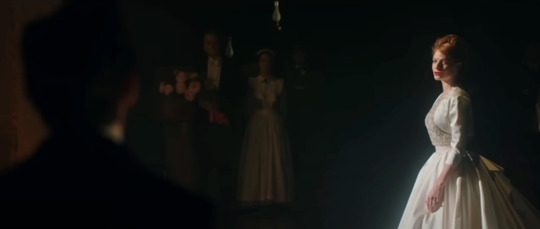
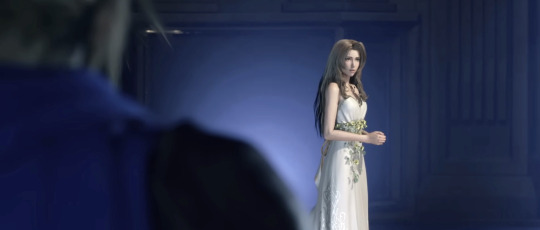
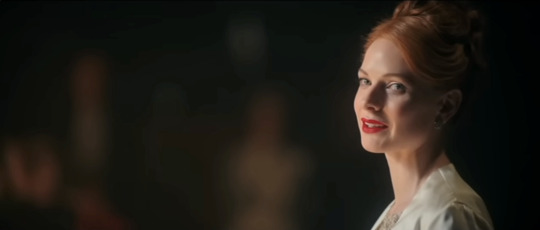

but what I didn't realize until I watched the TGS scene is that they pulled both romance options from it...only the high affection!Cloti scene handhold was inspired by Zac Efron & Zendaya's characters.






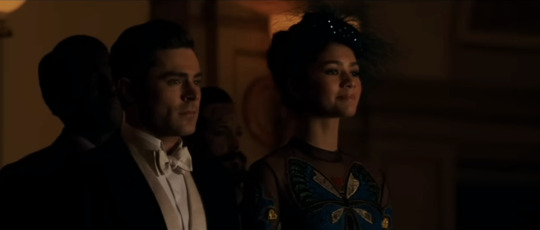
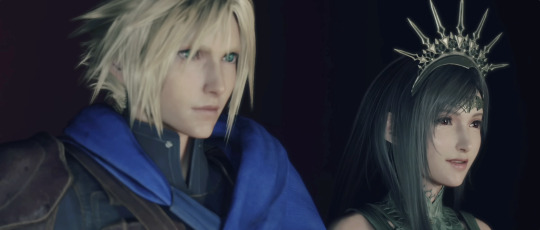
...honestly I'm not surprised, just amused they used so much from one place. This feels like finding all the parallels to Game of Thrones shots in FFXVI lmaooo
#there is no ship commentary going on here! I just love that you can CLEARLY see where inspo was drawn with games same as TV/film#also imagine thinking I spent 2 years doing parallel analysis for stranger things & it would stop when I moved to other fandoms on main LOL#clerith#cloti#cloud strife#tifa lockhart#aerith gainsborough#ffvii#ffvii analysis#ffvii spoilers#final fantasy#the me tag
153 notes
·
View notes
Text
Tifa's Theme: A Musical Deep Dive (Part I)
(A repost from my old side blog no longer in use. All future analyses will be on this one.)

Greetings and welcome to our deep-dive into Uematsu-senpai’s masterpiece of a character theme. We will examine the rich marriage between composition and storytelling – ie. how its musical elements express Tifa’s personality, conflictions, relationships, and story motifs. If you’ve come with zero knowledge in music theory, then my hopes are that you will leave here somewhat enriched (no prior knowledge is required). If you are a fellow geek for music, then I hope this adds insight in a storytelling sense. Ultimately, the goal of this post is to more deeply understand Tifa Lockhart.

I have divided this analysis into five sections each built on the prior: (A) the key; (B) the intro; (C) the leitmotif; (D) the game’s use of the leitmotif; and (E) the compilation’s use of the leitmotif. (The leitmotif of course being Tifa’s recurring melody, of which the first subphrase is sampled above.) Because Tumblr allows only 5 videos per post, each section will be its own post, bar for the first two which will overlap in Posts I and II.
So have your headphones/audio ready, and let us commence.
Disclaimer: these are simply my own interpretations offered with supporting evidences. I can only, to my best limited efforts, speculate as to what Uematsu did or did not intend when composing the piece.
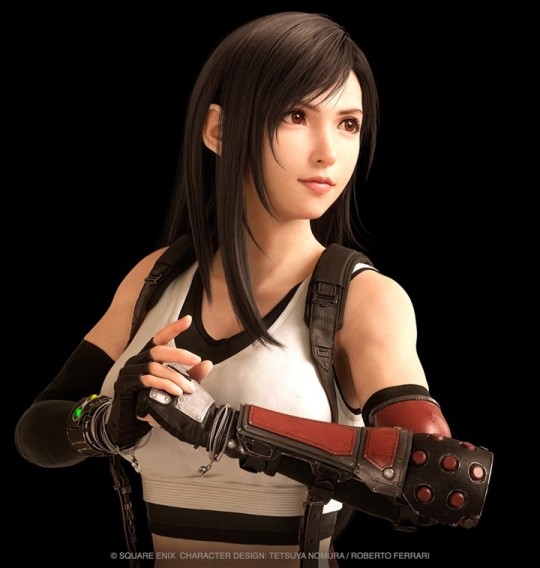
Section (A): The Key
Tifa’s Theme is composed in the key of F major, one of the happiest keys in music. It is argued by many, in fact, to be the happiest key (though this is subjective).
“F major is at once full of peace and joy…”
– Ernst Pauer (19th C. composer).
This is a reason, I presume, that Uematsu-san chose F major for the track which represents home.
“Welcome home, Cloud,” is the first line that Tifa speaks to Cloud in the game. “I’m home” (from the Japanese dub, 唯今 – “Tadaima”) is the last thing Cloud says to Tifa at the end of Advent Children. Home is our first story motif embodied by Tifa’s character.
But of course Uematsu’s decision likely only began there.
“F major is at once full of peace and joy, but also expresses effectively a light, passing regret – a mournful, but not a deeply sorrowful feeling.”
– Ernst Pauer (quote continued).
So we have peace and joy with an undertone of mournfulness; a juxtaposition between two opposing ends of the emotion spectrum. To appreciate how the key of F major achieves this, we can benefit from a quick comparison with two other tracks.
It might surprise you that Tifa’s Theme – our warm song of home – shares the very same key notes as the tensest and most sorrowful track in Final Fantasy VII. Listen to the Cries of the Planet is composed in F major’s relative minor key: D minor. It has the same key chords as F major, yet the chords serve different functions (something we will get to later). Put another way, it has all the same notes, yet they are arranged differently. Where F major is (argued) the happiest key in music, D minor is almost universally called the key of “true sorrow.”
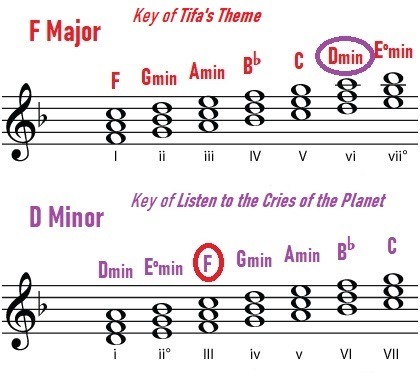
Let’s compare the two tracks here:
youtube
I wanted to begin with this little contrast for three reasons. First, to excite you non-music-theorists about the emotive power of music. Here, from our two related keys, come two completely contrasting moods. Second, we are concerned with what and how the notes will speak. Third, well… that’s a little more selfish. Listen to the Cries of the Planet is my favorite track in the game.
Our other track is the main section of One-Winged Angel (there are a total of three keys in this track.) It is curious that the foil character to Tifa has his theme in the relative minor of hers. Like a mirror – for as Sephiroth is Cloud’s darkness, Tifa is Cloud’s light. D minor is also the key from Those Chosen by the Planet.
youtube
And now, onto our deep-dive into Tifa’s Theme, which features in the original game, Advent Children, and 2020’s Remake. For now we’ll be using the piano sheets from Advent Children.
Section (B): The Intro
youtube
Tifa’s Theme begins with a tonic chord (the ‘home’ chord of our key). The further we move away from our tonic, the greater the tension (‘instability’) will be.
By ‘home’ here I am referring to the music’s tonal center – not ‘home’ the story motif which Tifa embodies. In light of that distinction, however, with the tonic being the home point of the track and home being a story motif central to Tifa’s character, we are simultaneously referring to both.
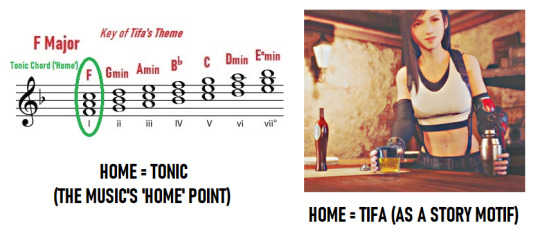
So we begin with our tonic (the F major chord) which draws us “at once [into] peace and joy.” Yet there is concurrently the hint of a mournful undertone. Only a tiny, tiny allusion – perfect for our introduction to Tifa. When we first meet her after all, we’ve no idea of the burdens locked in her heart.
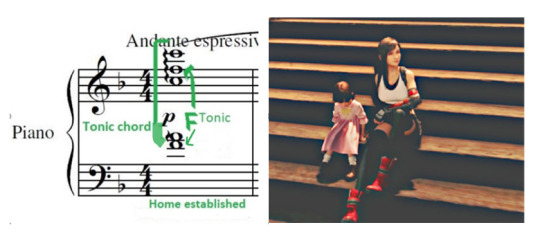
This opening tonic is presented in whole notes (the longest kind of note in common composition). In our piano version, these whole notes are arpeggiated (see the squiggly lines to their left), meaning that the chord is ‘spread’ or ‘rolled’ – the notes are played and held one after the other from the bottom up. We are at once drawn in by Tifa’s inviting warmth and we linger there.
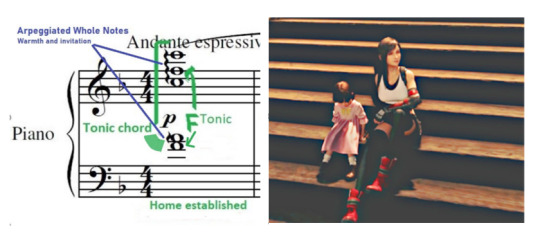
Our tonic is immediately succeeded by a chromatic chord (a chord composited of notes outside the key; notes that ‘don’t belong’). This second chord is, in fact, is the sort we would expect to find in F minor. It does not ‘belong’ in our key of F major – thus the mournful undertone which would have been further hinted is brought into direct statement. Foreshadowed is the revelation of Tifa’s burdens. She is carrying deep and unsettling secrets.
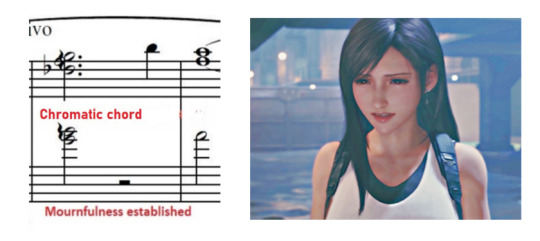
How does this work? Uematsu-san has effectively ‘borrowed’ the second chord of the F minor key and inserted it into the track’s opening chord progression. This subverts the natural expectation of our ears and creates instability – a trick he will frequently pull to toy with our emotions.
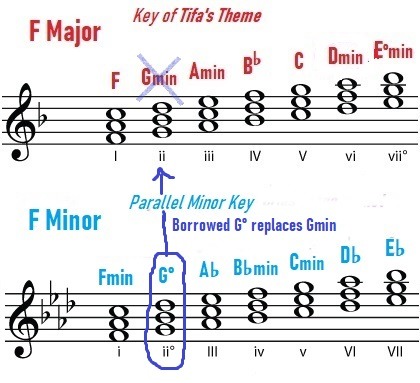
Uematsu-san then extended this borrowed chord to heighten the mournfulness by adding a 7th (a note seven intervals above the root note which further colors the mood). This enlarges the magnitude of Tifa’s mournfulness: we feel that her burdens are heavy.
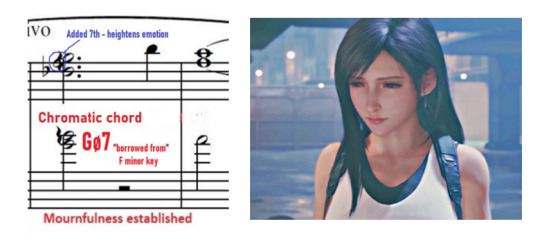
The next two bars instantly carry us back to the tonic (see the harmony on the bottom stave below). This occurs in a slow fall, a faster fall, then a faster, now extended lift: the intro’s re-establishment and emphasis on the motif of home. We are never to stray from feeling at home when we are around Tifa. Simultaneously, these bars speak the ‘locking away’ of Tifa’s burdens. Her sufferings are buried quickly as her love for others is brought to the forefront.
Where our chromatic chord had an added 7th to heighten the mournfulness, our tonic build is extended with a 7th and 9ths in its lift – heightening home in a stronger comparative sense. Tifa being a home to others, in other words, overpowers her own sufferings.

There are three things we can grasp from this sequence of slow-fall to faster-fall to faster-extended-lift.
First, Tifa holds a profound motherliness toward others which outweighs thought for her own wellbeing.
Second, Tifa is insecure in dealing with her emotions, and thus strives to keep herself distracted from them. We will see this displayed right from the time of her childhood:
At 8, unable to cope with her mother’s death, she treks up the perilous mountain to try and ‘find her’ on the other side;
At 15, unwilling to face the grief of her father’s murder, she recklessly rushes to confront Sephiroth;
At 17 (in Traces of Two Pasts), she confesses to Jessie that she has been “running” from learning the truth about Nibelheim;
At 20 (in Remake), she admits she’s not even allowed herself time to decorate her apartment;
At 22 (in On the Way to a Smile), she avoids being alone in keeping extra busy with the bar and the kids during Cloud’s absence.
Thirdly – and perhaps most jarringly – Tifa embodies home despite her life being plagued by suffering.
Tifa, who lost her home and had to rebuild her life from scratch, provides a home for Cloud, Marlene and Barret, Avalanche, and later, Denzel.
Tifa, who lost her mother as a child, mothers everyone else, is for all intent Marlene’s mother, and becomes the mother of a family unit with Cloud, raising two kids who are not her own.
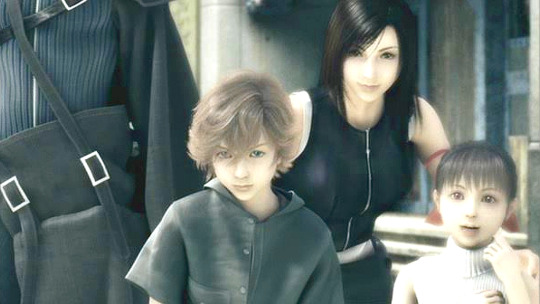
We have now travelled through the first subphrase of the intro.

youtube
We begin Subphrase Two with our opening tonic again, but this time in a quite surprising extension. Rather than adding a happy 7th or 9th to accentuate the warmth of our home chord, Uematsu-san gives us an E note which clashes with our F. Moreover, he builds the chord from this E as the bass (bottom) note.
What does this mean? Dissonance. Home is re-emphasized, but now directly with mournfulness. Although Tifa’s burdens are locked in her heart, they are ever lingering in the picture.
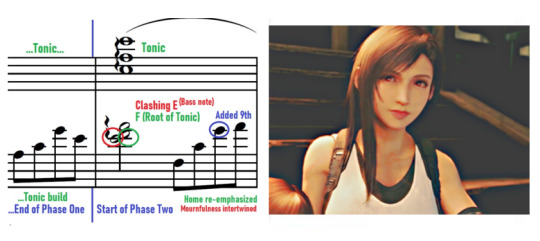
Compare this tonic (with the clashing E) to our opening tonic in Subphrase One. We now also have an additional climb in the harmony, which includes an added 9th. So while we can more deeply sense Tifa’s mysterious burdens (even though she’s our place of peace), extra emphasis is placed on her warmth and motherliness.
Subphrase One opening vs. Subphrase Two opening:
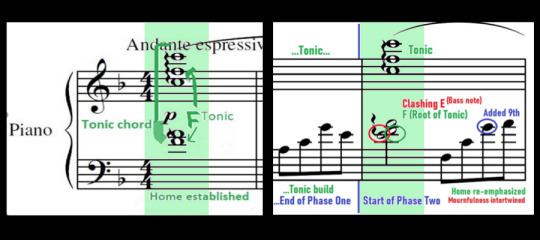
And so we continue Subphrase Two, following the pattern from Subphrase One. A chromatic chord follows the tonic – again ‘borrowed’ from the key of F minor – bringing Tifa’s plights to bubble once again. But before we can linger on them, we are taken back to an extended tonic chord – this time with an ‘unbelonging’ note.
From the next bar, however, things begin to shift…

Before moving onto this shift, let’s consider what we’ve covered so far. We began “at once full of peace and joy” (Tifa’s warmth pulled us toward her, pulled us home), to be immediately carried into an expression of suffering (Tifa’s secret, unsettling burdens were glimpsed). That suffering was overpowered – but not entirely suppressed – by a magnified emphasis of home (Tifa locked her burdens away behind her nurturing kindness). The suffering surfaced briefly again, and again home was accentuated (Tifa’s endless heartache continues, beneath the bounds of her love).
As is very clear by now, Tifa is facing great internal conflictions. Let us dig into what the music so far has conveyed of those conflictions.
Spoken in long-value notes, our Subphrase One melodic chords convey Tifa’s hesitance in expressing her burdens. That they shift and waver between tonic and chromatic conveys her uncertainty.
Subphrase One conveying hesitance (in long-value notes):

Subphrase One conveying uncertainty (tonic > chromatic > tonic):

Tifa is longing to confront Cloud with the truth of his psyche. At the same time, she is uncertain of both what that will bring and what the truth is: she fears losing Cloud; and she doubts the validity of her own memories from the events he is recounting so accurately. These hesitancies, fears and doubts are gnawing at her heart, buried from the rest of the world under the forefront of home.
Subphrase Two contains less long-value notes and more wavering than Subphrase One, building the intensity of Tifa’s conflicts clashing within her. Rather than wavering from tonic to chromatic to tonic, we go from a dissonant tonic to a chromatic chord to a tonic with chromaticism to more tension in a predominant chord. I’ll get to what this means in the next post, but for now, just know it is a chord of instability.
Subphrase Two (less the final bar) building instability:

Following our new tension chord (the predominant G minor in blue) we have just one bar left to end the phrase. As it is the end of the intro as a whole, we expect to return to the tonic. But (bless Uematsu and his subversions)… the opposite happens.
Our ears expect resolution, but we are instead dragged right into the highest point of tension. Here, we are pulled into the world of the dominant chord.
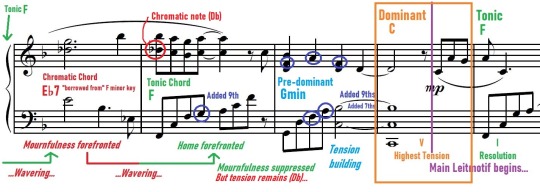
Continued in Part II here.
#final fantasy#final fantasy vii#final fantasy 7#ffvii#ff7#advent children#nobuo uematsu#tifa lockhart#cloud strife#sephiroth#avalanche#cloud x tifa#cloti#music analysis#character analysis#my deep dives
22 notes
·
View notes
Text
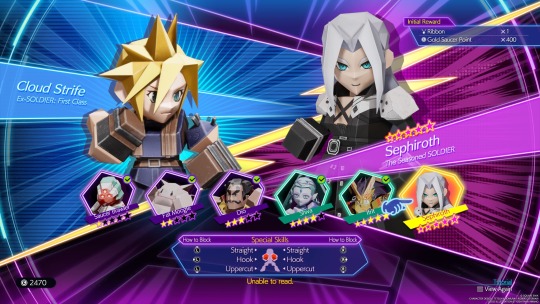
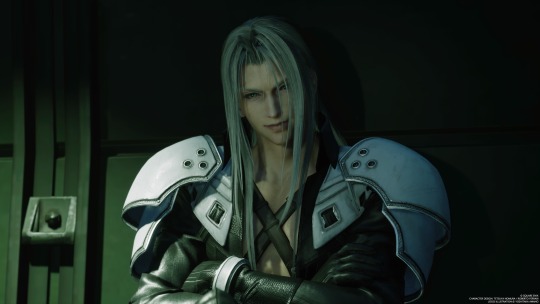






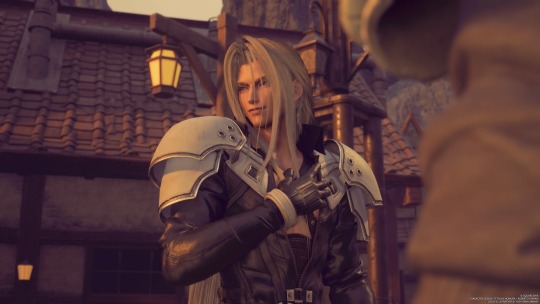
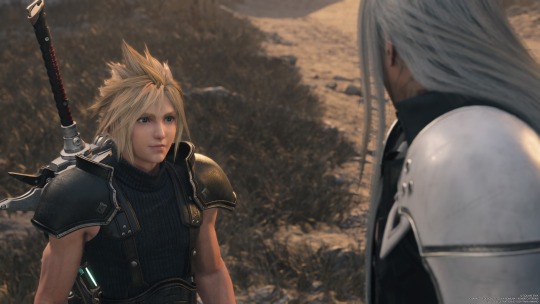
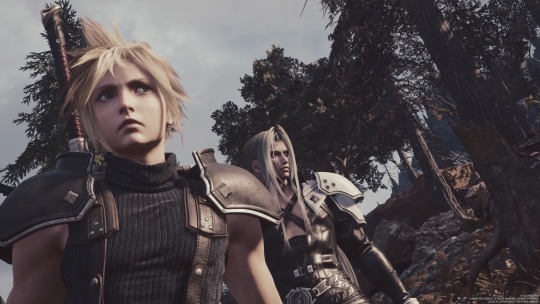
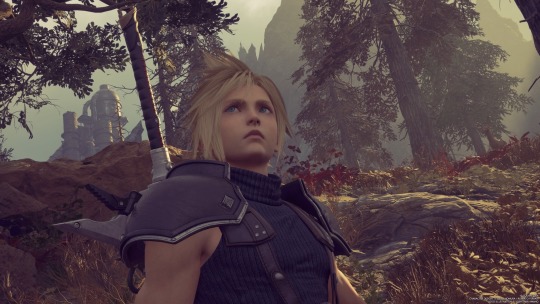

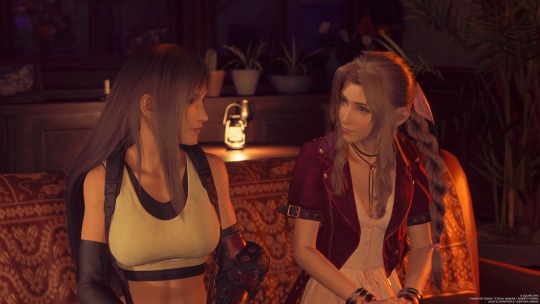

Completed the final 3D Brawler challenge last night, then started up a slow run-through of chapter one for the hard mode trophy ...
... it quickly evolved into the Sephiroth photoshoot.
I just, have a lot of feelings about pre!JENOVA discovery Sephiroth.
#ffvii rebirth#ff7 rebirth#final fantasy vii rebirth#gaming: final fantasy vii: rebirth#gaming: final fantasy vii#misc: gaming#my graphics#i'm like 99% sure i have an old buried document somewhere from years ago that was sephiroth character analysis#nice to know that even after all this time some thing haven't changed lmao#long post
10 notes
·
View notes
Text
Aerti Reading of No Promises to Keep
So, new FF7 theme song, new group of lyrics to analyze, debate about Who It's About. While I'm fairly certain it's about all the people who Aerith came to know and who care for her, I can't help but feel that they lyrics point towards Tifa most of all. Perhaps it's simply shipping vision, but Hollow, while generally being about Cloud's state of mind trying to handle loss, definitely feels like it centers around Cloud's relationship with Zack specifically.
I'm not gonna write an essay about those two, but I will link to a video that pretty much embodies every reason why it embodies Zakkura:
youtube
But now, let's break down No Promises to Keep with that in mind. Hopefully I don't kick any hornets' nests in the process.
Walking city streets with worn cobblestones
Listening to people rushing past to rhythms all their own
Life passing me by, not thinking how the years have flown
Until I met you
This portion can apply to Zack, Cloud, and Tifa pretty equally. All three of them played a part in Aerith engaging more in her own life. Zack kickstarted her flower-selling business; Cloud's fall led to her leaving Sector 5 with him and deciding to help rescue Tifa; and Tifa herself became her closest confidant and friend, both of them acting like each other's childhood girl friend that neither of them had a chance to experience.
I won't say that it was fate
I won't say that it was destiny
But if not, what could it be that drew you towards me?
Could it be chance?
Let's be real- the fact that Aerith met Tifa at all is an absolutely wild chain of events from an outside perspective. Because Zack got her to start selling flowers topside, she ran into Cloud and happened to meet him once again when his fall from above landed in a church she frequents to gather flowers from. Then, when she accompanied him out of Sector 5, Chocobo Sam's cart carrying Tifa passed by and fired Aerith up to help rescue her.
Given that the Whispers only show up when the destiny of the Planet needs to be corrected, there's definitely an implication that all of these events were fated to occur. However, given that the Remake Trilogy's themes are heavy on changing destiny and if fates are fixed, these lines could be reflective of how Aerith is trying to fight the future she saw. Thus, she doesn't want to attribute the reason she met these people important to her to something greater. Better for it all to be pure chance that she knows them, that they sought each other out instead of being herded towards one another.
Till the day that we meet again
Where or when?
I wish I could say
But believe—know that you'll find me
Promises to keep, we won't ever need
While this is very much a general sentiment of Aerith wanting to be with her friends again after her death, the last line's rather striking to me. She doesn't need a promise for them to meet again- they will, even though she has no guarantee for how it'll happen. It's meant to reassure the ones she's singing to, and when it comes to someone who relied on a promise to keep herself connected to an important person in her life, Tifa Lockhart is the first one to come to mind.
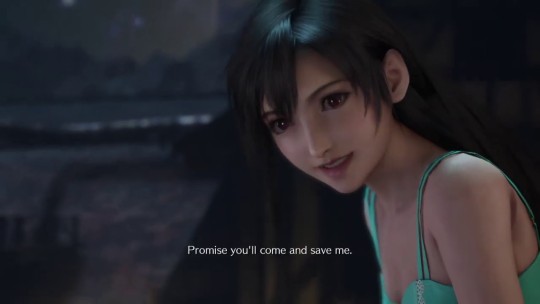
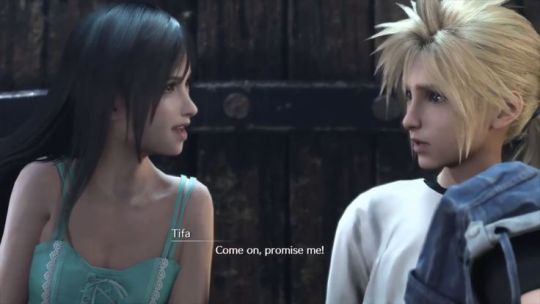
Tifa has a lot of abandonment issues, rightfully so given... *gestures at her entire history*. At this point in her life, her childhood friend group had started seeing her as a romantic prospect and severely strained her ability to be open with them. Cloud, distant as he was, felt like the only one she could connect with who wasn't openly trying to court her, the closest one to treating Tifa like Tifa instead of a Young Maiden. If he leaves, she would lose the one person her age who talks to her like a person, and there's no guarantee that they would ever see each other again once he's gone. Trace of Two Pasts says that Tifa had a "special 'like'" for him, one that she couldn't afford to lose. So she comes up with the promise, a way to cope with the loneliness, something to believe in, like how she tried crossing Mt. Nibel to find her deceased mother on the other side.
She's the type of person who would need this kind of reassurance, especially with someone she's developed a close relationship with. Rebirth is not shy in showing that Aerith and Tifa are basically inseparable. And given the *ahem* separation which occurs at the end of Rebirth, Aerith would want to try and soften the pain and despair that would come for Tifa through the grief. If she could tell Tifa when or where they'll reunite, she would, but all she can do for now is help Tifa believe that they will meet again, that this parting is temporary and she won't need to mourn forever.
If only I'd never known
All the burdens I was born to bear
Lived a life without a care in the world save for you…
But that won't do
Remake Aerith's gotten some glimpses of what will happen in the future/has happened in the past, something that's clearly weighed on her throughout the games. She's scared of the Whispers stealing away those parts of her, warns Cloud not to fall in love with her, and tries to keep Marlene and Red XIII as out of her memories/visions as best she can. But she knows she's meant to die for the sake of the Planet
Even beyond the meta elements of it, Aerith's status as a Cetra- the last Cetra- and her connection to the Lifestream has prevented her from really feeling as just another girl. She's the centerpiece of Shinra's plan to find the Promised Land, she's watched over by the Turks, she's been trapped since her birth and has never been able to make any real choices.
Wouldn't it be nice to be ignorant of all that? To have even a year where she didn't feel the weight of the world on her shoulders and could live as a carefree girl who loves flowers? But even if she could sweep away all those worries, she would still want to know the important people in her life and all the struggle that comes from caring. Now, that's an impossible dream, a good dream. To go shopping topside with her friends, going on a beautiful date with Tifa in Costa del Sol, basking in the wonder of the Gold Saucer. It would be nice to stay in those fantasies forever, but the future's approaches, it's survival hinging on her playing her part. So she has to let them fall to the wayside.
Till the day that we meet again
On our street, I want to believe
In the chance that we'll share a glance
Promises to keep, we won't ever need
Much the same sentiment as the first chorus, but this time focusing on Aerith's perspective. Even though she put her carefree dreams aside, she needs to hold onto the belief that there's simply a chance for them to see each other again.
Aerith and Tifa have a recurring gesture of turning towards each other to connect, eye-to-eye, heart-to-heart. That's their way to communicate with each other in a way only they get to hear and see.
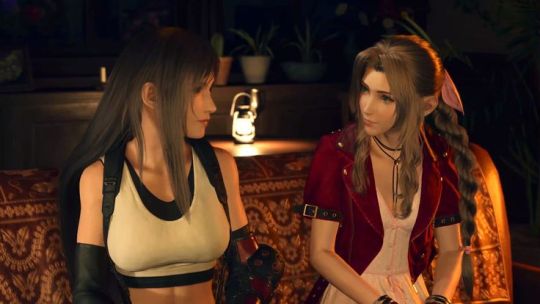
Then, in the ending scenes of Rebirth, when everyone's getting up to leave the altar, Cloud and Aerith look back to wait for Tifa, with Aerith in the foreground. When Tifa shakily gets up, takes a breath and turns around, Aerith's not there for her to look into her eyes, to share a mischievous smile with, to whisper their little jokes to. Maybe Tifa can't see Aerith now, but Aerith wants to believe that they might get to share a glance with each other one more time.
Till the day that we meet again
At our place, just let me believe
In the chance that you'll come
Take my hand and never let me go
Take my hand
And believe
We can be
Together evermore
I don't think I need to point out how often Tifa holds onto Aerith's hand or has to catch her in her arms. Granted, a number of these happen in life-threatening situations, but we're in a JRPG here- those moments are basically flirting without calling it flirting /s. Honestly, though, these ladies give so much physical affection and care for each other. It'd take forever to put down all the examples, but you could probably find some real easy just by searching up Aerti, so let's move on to the last bit of the song.
Walking city streets with worn cobblestones
Struggling against the crowds and finding ourselves all alone
Fate and destiny are no guarantee
Still I hope someday you'll come and find me
Still I know someday you'll come and find me
Once again with walking through busy streets. Though this time the two of them make it through the crowd and get to be alone. The only crowd I can think of is Tifa pulling Aerith through the Gold Saucer crowd to get closer to the front. As for the two of them being alone, off the top of my head there's the room in Kalm and the cargo hold on the cruise ship where they're softly sharing their Pre-Order Pasts with one another... seemingly only with each other for now. And once more, there's a lack of trust put in fate and destiny.
However, she hopes and then knows that she'll be found be this person. Really reminds one of a pretty vulnerable moment Aerith had in Remake does it not?
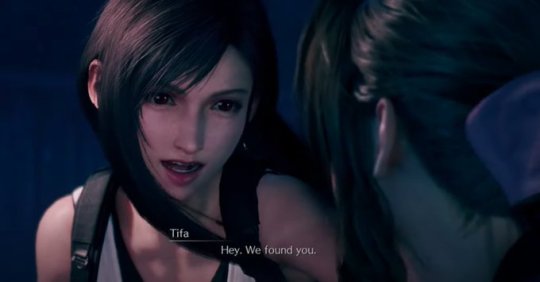
She was already found once. She trusts that she'll be found again... someday.
#rebirth spoilers#aerti#aerith x tifa#aerith gainsborough#tifa lockhart#ffvii rebirth#ff7#final fantasy vii#final fantasy 7#no promises to keep#shipping#ship thoughts#song analysis#Youtube
14 notes
·
View notes
Note
Since Rebirth really expanded on Cloud and Tifa’s relationship, how do you think the devs will expand on the Lifestream and Highwind scenes? Do you think they will expand on it in any other areas?
They already are, the scene with Tifa in Gongaga is already an expansion on the lifestream scene.
It's interesting that the the second part of a trilogy of games only ended at the end of disc 1 out of three. While the OG is definitely front loaded in regards to content this still means that they left A LOT for the third game.
I've been thinking about why this might be and how they might want to handle the structure for the third game. It seems likely, both in general and from looking at the first two games, that SE wants the games to all be able to stand on their own as separate games, while also being a part of a whole. The fact that we've had two insanely massive end fights where from a larger perspective that isn't really justified, really shows that by itself.
Stories tend to fall into predictable patterns or story structures. The OG especially follows the classic "heroes Journey" structure popularized by Joseph Campbell.

Before the Hero is able to overcome the villain, aka the external threat, he must first overcome himself, aka, the internal threat.
The first meeting with the Villain ends in failure, a story where everything just goes according to plan is generally not very satisfying. If we look at star wars this happens at the end of the empire strikes back. Luke goes off to face Darth vader before he's ready and as a result he loses his hand. Han is also trapped in carbonite and in generally we're in the lowest of lows.
Same happens in Rebirth, from a larger narrative Aerith dying and Cloud losing his mind represents this low point. We're in the 'death and rebirth' section of the heroes journey. In the OG, and also in remake from the perspective of the larger narrative, this lowest of lows happens when Cloud hands the black materia to Sephiroth, falls into the lifestream, and meteor is summoned. The first encounter with the big bad fails because Cloud has not yet fulfilled his internal character arc.
The lifestream sequence represents the "revelation", it's where Cloud faces his internal arc, which will then give him the information needed to confront Sephiroth successfully. My guess is that one of the reasons that the story is structured the way it is is to allow part three to once again stand alone in a three act structure, while also working as the final act when seen as a whole.
Most likely part 3 will use Clouds delusions concerning Aeriths survival as well as the early cut-off point, to allow for enough material to work towards a new "death and rebirth" section when they finally reach north crater, which will then allow for the LS sequence to be relatively late in the third game as well as to serve as a "conclusion" of some sort. I've seen other people argue that it will be relatively early in part 3 but that would surprise me, I think half-way at the earliest. Post lifestream every character should have reached their "perfect self", they should all have confronted the things they needed to confront, bringing them to the place where all that is left is to resolve their final challenges. Going back to Midgar, confront Hojo, confront Zack and Aeriths Death, and as always, Cloud and Tifa confronting their feelings for each other on the eve of the final battle.
Seeing as how important these events are for the story to function and be the best telling it could possibly be, I cannot imagine them not getting the care and detail that you'd expect from something so pivotal.
Hope that answers your question.
17 notes
·
View notes
Text
The Relationship Between Glenn and Rufus
[Ultimania Screenshot Removed Until Square Enix Lifts Copyright Strikes]
Glenn, a messenger from Wutai, appears often before Rufus. Though their conversations suggest that the two were old acquaintances, the exact nature of their relationship remains a mystery. Here is a summary of their meaningful exchanges and the relationship between them and Wutai as depicted in related works.
In the small box, it has some information on Rufus and Team Glenn’s connections to Wutai.
In "FVII Before Crisis", four years ago, Rufus lent a hand to the Wutai-based Avalanche.
Glenn comes into contact with Sephiroth, who was dispatched to Wutai seven years ago, in the opening of "The First Soldier" arc of "FFVII Ever Crisis".
Matt and Lucia, who were Glenn's colleagues (introduced by Yuffie in CHAPTER 7 as the "three ex-soldiers"), appear as captains in flashback scenes of the original Avalanche soldiers.
A small text wall next to Glenn’s death scene says:
When Rufus heard Glenn's name in Junon, a vision of him shooting a man flashes through his mind.
Text wall beside the “Please contact Captain Matt” dialogue says:
It appears that Matt and Lucia were participating in the operation to attack the Shinra Building.
-
Examples of Important Conversations Between Glenn and Rufus
[Ultimania Screenshot Removed Until Square Enix Lifts Copyright Strikes]
Rufus: "You're alive?"
Glenn: "Most certainly dead.”
(This was a bit of dialogue in the game that was difficult to translate. If anyone has a correction for it, please let me know. It appears that Glenn says he is “Dead, of course” to Rufus’ statement).
Rufus is surprised at Glenn's survival, and Glenn responds with a laugh. It sounds like a joking response, but based on his later words and actions, it may not be a joke at all.
-
Rufus: "The Governor will not stand on such a poor set.”
Glenn: "I see! Growing up a young master/rich kid is so bothersome.”
Rufus said these words as if he knew Sufur’s personality well. Glenn calls Sufur a rich kid/brat, but in Junon, he also mocked Rufus, saying, “Fond of (drawing) visions as ever, young master/rich kid).”
(I once again have been trying to receive help on this specific line because the connection here is how Glenn calls both Sufur and Rufus “Botchan,” which is an interesting term for a rich young master or boy. More in this in another post).
Glenn & Sephiroth: "Our 'Promised Land' will be born." Good (for you), you’ve succeeded your father.”
In the commentary scene, Sephiroth's appearance and voice overlap with Glenn, implying that Glenn's actions up to that point were in line with Sephiroth's intentions.”
Glenn: “As good at shooting people in the back as ever.”
A line that suggests that Rufus once shot Glenn in the back. It is also revealed in this scene that the person who had been thought to be Glenn was one of those in the black cloaks.
-
My translations are rough at the moment because I am hurrying, but I trust that I was able to get the essential parts accurate.
This is not much new information but I would say it confirms some things.
-
1. Glenn is dead.
2. It was a black cloak in line with Sephiroth’s intentions. Based on the other instances where black cloaks interact with Cloud with Sephiroth’s intentions, it is safe to say that this was also Sephiroth. A part of his will perhaps.
3. There is nothing suggesting that this was Jenova, as some were saying.
4. Sephiroth heavily mocks Rufus at every chance he gets and appears to hate him passionately.
5. Glenn came in contact with Sephiroth 7 years after Sephiroth was dispatched to Wutai. This is the opening of the First Soldier.
6. Rufus and the Before Crisis plot of his involvement with Avalanche has been confirmed.
-
#now to keep working on an analysis post with the rest of “glenn’s” dialogue#glenn lodbrok#team glenn#rufus shinra#sephiroth#wutai#ffvii rebirth#fvii first soldier#ffvii#final fantasy 7#ff7#the first soldier#fvii rebirth spoilers#rebirth spoilers
118 notes
·
View notes